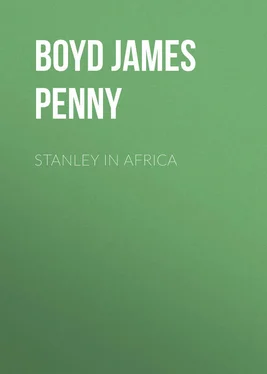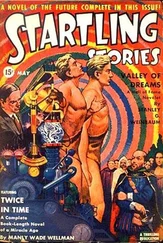James Boyd - Stanley in Africa
Здесь есть возможность читать онлайн «James Boyd - Stanley in Africa» — ознакомительный отрывок электронной книги совершенно бесплатно, а после прочтения отрывка купить полную версию. В некоторых случаях можно слушать аудио, скачать через торрент в формате fb2 и присутствует краткое содержание. Жанр: foreign_antique, foreign_prose, на английском языке. Описание произведения, (предисловие) а так же отзывы посетителей доступны на портале библиотеки ЛибКат.
- Название:Stanley in Africa
- Автор:
- Жанр:
- Год:неизвестен
- ISBN:нет данных
- Рейтинг книги:3 / 5. Голосов: 1
-
Избранное:Добавить в избранное
- Отзывы:
-
Ваша оценка:
- 60
- 1
- 2
- 3
- 4
- 5
Stanley in Africa: краткое содержание, описание и аннотация
Предлагаем к чтению аннотацию, описание, краткое содержание или предисловие (зависит от того, что написал сам автор книги «Stanley in Africa»). Если вы не нашли необходимую информацию о книге — напишите в комментариях, мы постараемся отыскать её.
Stanley in Africa — читать онлайн ознакомительный отрывок
Ниже представлен текст книги, разбитый по страницам. Система сохранения места последней прочитанной страницы, позволяет с удобством читать онлайн бесплатно книгу «Stanley in Africa», без необходимости каждый раз заново искать на чём Вы остановились. Поставьте закладку, и сможете в любой момент перейти на страницу, на которой закончили чтение.
Интервал:
Закладка:
In reading of Stanley and studying the characteristics of his work one naturally gravitates to the thought, that in all things respecting him, the older countries of Europe are indebted to the genius of the newer American institution. We cannot yet count upon the direct advantages of a civilized Africa upon America. In a political and commercial sense our activity cannot be equal to that of Europe on account of our remoteness, and because we are, as yet, but little more than colonists ourselves. Africa underlies Europe, is contiguous to it, is by nature situated so as to become an essential part of that mighty earth-tract which the sun of civilization is, sooner or later, to illuminate. Besides Europe has a need for African acquisition and settlement which America has not. Her areas are small, her population has long since reached the point of overflow, her money is abundant and anxious for inviting foreign outlets, her manufacturing centres must have new cotton and jute fields, not to mention supplies of raw material of a thousand kinds, her crowded establishments must have the cereal foods, add to all these the love of empire which like a second nature with monarchical rulers, and the desire for large landed estates which is a characteristic of titled nobility, and you have a few of the inducements to African conquest and colonization which throw Europe in the foreground. Yet while all these are true, it is doubtful if, with all her advantages of wealth, location and resource, she has done as much for the evangelization of Africa as has America. No, nor as much for the systematic and scientific opening of its material secrets. And this brings us to the initial idea of this paragraph again. Though Stanley was a foreign waif, cast by adverse circumstances on our shores, it seemed to require the robust freedom and stimulating opportunities of republican institutions to awaken and develop in him the qualities of the strong practical and venturesome man he became. Monarchy may not fetter thought, but it does restrain actions. It grooves and ruts human energy by laws of custom and by arbitrary rules of caste. It would have repressed a man like Stanley, or limited him to its methods. He would have been a subject of some dynasty or a victim of some conventionalism. Or if he had grown too large for repressive boundaries and had chosen to burst them, he would have become a revolutionist worthy of exile, if his head had not already come to the block. But under republican institutions his energies and ambitions had free play. Every faculty, every peculiarity of the man grew and developed, till he became a strong, original and unique force in the line of adventure and discovery. This out-crop of manhood and character, is the tribute of our free institutions to European monarchy. The tribute is not given grudgingly. Take it and welcome. Use it for your own glory and aggrandizement. Let crowned-heads bow before it, and titled aristocracy worship it, as they appropriate its worth and wealth. But let it not be forgotten, that the American pioneering spirit has opened Africa wider in ten years than all the efforts of all other nations in twenty.
CONGO FREE STATE
In 1877, Stanley wrote to the London Daily Telegraph as follows: —
“I feel convinced that the question of this mighty water-way (the Congo) will become a political one in time. As yet, however, no European power seems to have put forth the right of control. Portugal claims it because she discovered its mouth; but the great powers, England, America, and France, refuse to recognize her right. If it were not that I fear to damp any interest you may have in Africa, or in this magnificent stream, by the length of my letter, I could show you very strong reasons why it would be a politic deed to settle this momentous question immediately. I could prove to you that the power possessing the Congo, despite the cataracts, would absorb to itself the trade of the whole enormous basin behind. This river is and will be the grand highway of commerce to West Central Africa.”
When Stanley wrote this, with visions of a majestic Congo Empire flitting through his brain, he was more than prophetic; at least, he knew more of the impulse that was then throbbing and permeating Europe than any other man. He had met Gambetta, the great French statesman, who in so many words had told him that he had opened up a new continent to the world’s view and had given an impulse to scientific and philanthropic enterprise which could not but have material effect on the progress of mankind. He knew what the work of the International Association, which had his plans for a Free State under consideration, had been, up to that hour, and were likely to be in the future. He was aware of the fact that the English Baptist missionaries had already pushed their way up the Congo to a point beyond the Equator, and that the American Baptists were working side by side with their English brethren. He knew that the London and Church Missionary Societies had planted their flags on Lakes Victoria and Tanganyika, and that the work of the Free Kirk of Scotland was reaching out from Lake Nyassa to Tanganyika. He had seen Pinto and Weissman crossing Africa and making grand discoveries in the Portuguese possessions south of the Congo. De Brazza had given France a West African Empire; Germany had annexed all the vacant territory in South-west Africa, to say nothing of her East African enterprises; Italy had taken up the Red Sea coast; Great Britain had possessed the Niger delta; Portugal already owned 700,000 square miles south of the Congo, to which no boundaries had been affixed.
Stanley knew even more than this. His heroic nature took no stock in the “horrible climate” of Africa, which he had tested for so many years. He was fully persuaded that the plateaus of the Upper Congo and the central continent were healthier than the lands of Arkansas, which has doubled its population in twenty-five years. He treated the coast as but a thin line, the mere shell of an egg, yet he saw it dotted with settlements along every available water-way – the Kwanza, Congo, Kwilu, Ogowai, Muni, Camaroon, Oil, Niger, Roquelle, Gambia and Senegal rivers. He asked himself, What is left? And the answer came – Nothing, except the basins of the four mighty streams – the Congo, the Nile, the Niger and the Shari (Shire), all of which require railways to link them with the sea. His projected railway from Vivi, around the cataracts of the Congo, to Stanley Pool, 147 miles long, would open nearly 11,000 miles of navigable water-way, and the trade of 43,000,000 people, worth millions of dollars annually.
The first results of Stanley’s efforts in behalf of a “Free Congo State” were, as already indicated, the formation of an international association, whose president was Colonel Strauch, and to whose existence and management the leading powers of the world gave their assent. It furnished the means for his return to Africa, with plenty of help and with facilities for navigating the Congo, in order to establish towns, conclude treaties with the natives, take possession of the lands, fix metes and bounds and open commerce – in a word, to found a State according to his ideal, and firmly fix it among the recognized empires of the world.
In January, 1879, Stanley started for Africa, under the above auspices and with the above intent. But instead of sailing to the Congo direct, he went to Zanzibar on the east coast, for the purpose of enlisting a force of native pioneers and carriers, aiming as much as possible to secure those who had accompanied him on his previous trips across the Continent and down the river, whose ascent he was about to make. Such men he could trust, besides, their experience would be of great avail in so perilous an enterprise. A second object of his visit to Zanzibar was to organize expeditions for the purpose of pushing westward and establishing permanent posts as far as the Congo. One of these, under Lieut. Cambier, established a line of posts stretching almost directly westward from Zanzibar to Nyangwe, and through a friendly country. With this work, and the enlistment of 68 Zanzibaris for his Congo expedition, three-fourths of whom had accompanied him across Africa, he was engaged until May, 1879, when he sailed for the Congo, via the Red Sea and Mediterranean, and arrived at Banana Point at the mouth of the Congo, on Aug. 14, 1879, as he says, “to ascend the great river with the novel mission of sowing along its banks civilized settlements, to peacefully conquer and subdue it, to mold it in harmony with modern ideas into national States, within whose limits the European merchant shall go hand in hand with the dark African trader, and justice and law and order shall prevail, and murder and lawlessness and the cruel barter of slaves shall forever cease.”
Читать дальшеИнтервал:
Закладка:
Похожие книги на «Stanley in Africa»
Представляем Вашему вниманию похожие книги на «Stanley in Africa» списком для выбора. Мы отобрали схожую по названию и смыслу литературу в надежде предоставить читателям больше вариантов отыскать новые, интересные, ещё непрочитанные произведения.
Обсуждение, отзывы о книге «Stanley in Africa» и просто собственные мнения читателей. Оставьте ваши комментарии, напишите, что Вы думаете о произведении, его смысле или главных героях. Укажите что конкретно понравилось, а что нет, и почему Вы так считаете.












